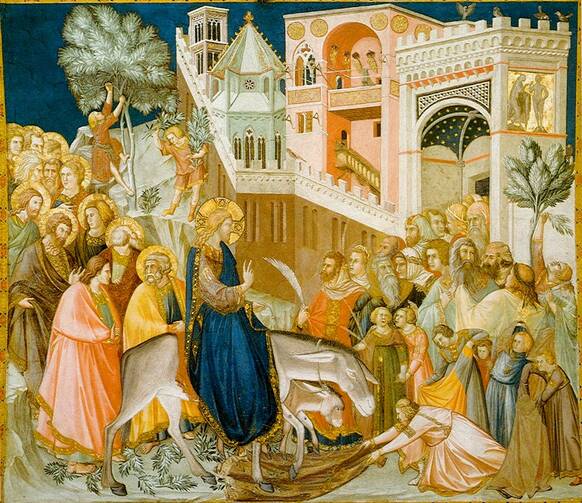Killing Jesus is a sure and swift read. Bill O’Reilly and Martin Dugard write like newscasters, rapidly analyzing facts. Here is the entry into Jerusalem:
Just on the other side of Bethpage, the two disciples stand waiting. One holds the bridle of a donkey that has never been ridden. The animal is bareback. A disciple removes his square cloak and lays it across the animal’s back as an improvised saddle. The other disciples remove their cloaks and lay them on the ground in an act of submission, forming a carpet on which the donkey can walk. Following this example, many of the pilgrims remove their own cloaks and lay them on the ground. Others gather palm fronds or snap branches off olive and cypress trees and wave them with delight.
This is the sign everyone has been waiting for. This is the fulfillment of Zechariah’s prophecy.
“Blessed is the king!” shouts a disciple.
The people join in, exalting Jesus and crying out to him. “Hosanna,” they chant. “Hosanna in the highest.”
Jesus rides forth on the donkey, and the people bow down.
“O Lord, save us,” they implore, thankful that the Christ has finally come to rescue them. “O Lord, grant us success. Blessed is he who comes in the name of the Lord.” The words of thanksgiving are from Psalm 118, a psalm sung at Passover. This is the moment for which these simple peasants have waited so long. Of all the thousands of pilgrims who set out from Galilee, these are the lucky few who can tell their children and their children’s children that they witnessed the grand moment when Jesus the Christ rode triumphantly into Jerusalem.
But not everyone bows down. A group of Pharisees has been waiting for Jesus and now look on with disgust. They call out to him, giving the Nazarene one last chance to avoid a charge of blasphemy. “Teacher,” they yell, “rebuke your disciples!”
But Jesus refuses. “I tell you,” he informs the Pharisees, “if they keep quiet, even the stones will cry out.”
Others who have heard that Jesus is near have run out from Jerusalem, spreading palm branches across the path of the Nazarene. This is a traditional sign of triumph and glory.
The donkey stops atop the Mount of Olives. Jesus takes it all in. Tents cover the hillside, for this is where the poor Galileans camp during Passover. Jerusalem calls out to Jesus from just across the small Kidron Valley, and the Temple gleams in the midday sun. Throngs of pilgrims line the path winding down into the valley. The mud-and-limestone trail is remarkably steep, and Jesus will have to use great caution to guide the donkey downhill without getting thrown.
This is his day. Jesus’ whole life has pointed to this moment, when he will ride forth to stake his claim to the title “king of the Jews” (185-187).
O’Reilly and Dugan don’t overstate the case with that last sentence. They underscore what should not be overlooked. Jesus isn’t the passive victim of a Passover plot. He intentionally lays claim to the promises of Israel in way that cannot be ignored. To allow one’s self to be hailed, as he does, in the Holy City of Jerusalem, at the time of Passover, is clearly a provocative act.
To their credit, O’Reilly and Dugan focus the question, much as Saint Matthew when he added, to Saint Mark’s account, the Messianic verse from Zechariah. There can be no contemporary nonsense that Jesus himself preached only an anodyne goodness, one anyone could accept, while the Church proclaims a Christ who calls us to decision, who makes demands upon us.
To ride into Jerusalem, when he did, as he did, was to stake a claim, one for which his life would stand as credit. The demand is one that only God has a right to make of us. O’Reilly and Dugard correctly note that “to claim he is the Son of God would make Jesus one of three things: a lunatic, a liar, or a divinity who fulfills Scripture” (189). Like the people of Jerusalem, we must decide who Jesus is. He has summoned our souls. To ignore his call, one needs rewrite history itself.
Matthew 21: 1-11 Isaiah 50: 4-7 Philippians 2: 6-11 Matthew 26:14-27:66








